

JournalTOCs. Access to Research. Musings about librarianship: 5 things Google Scholar does better than your library discovery service. I have had experience implementing Summon in my previous institution and currently have some experience with EDS and Primo (Primo Central).
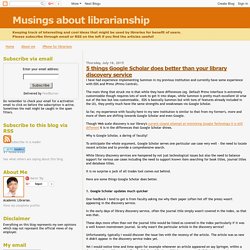
The main thing that struck me is that while they have differences (eg. Default Primo interface is extremely customizable though requires lots of work to get it into shape, while Summon is pretty much excellent UI wise out of the box but less customizable, EDS is basically Summon but with tons of features already included in the UI), they pretty much have the same strengths and weaknesses via Google Scholar. So far, my experience with faculty here in my new institution is similar to that from my former's, more and more of them are shifting towards Google Scholar and even Google.
Though Web scale discovery is our library's current closest attempt at mimicking Google Technology it is still different it is in the differences that Google Scholar shines. Why is Google Scholar, a daring of faculty? It is no surprise a jack of all trades tool comes out behind. Digital past. Dryad Digital Repository - Dryad.
8 Free Mind Map Tools & How to Best Use Them. Advertisement Here’s the good news.
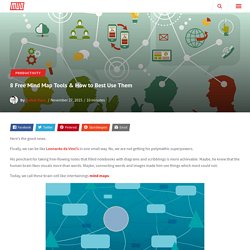
Finally, we can be like Leonardo da Vinci’s in one small way. No, we are not getting his polymathic superpowers. His penchant for taking free-flowing notes that filled notebooks with diagrams and scribblings is more achievable. Maybe, he knew that the human brain likes visuals more than words. Today, we call these brain-cell like intertwinings mind maps. It is the most popular brainstorming technique of all. For a student, a mind map is a memory aid to review notes. You can apply a mind map to any office scenario. Forecast revenue.Prepare for a hiring interview.Chart product development and marketing.Fine tune a RFP (Request for Proposal).Organize a trade show.Plan an office party. Pick a Free Mind Map Tool Choosing from the many excellent mind mapping and brainstorming web apps and tools is a matter of nitpicking. Free or paid. We have covered many mindmapping tools here at MakeUseOf. 1.
Platforms: Web, Chrome Noteworthy Features: 24 Essential Mind Mapping and Brainstorming Tools. Mind mapping is the process of using visual diagrams to show the relationships between ideas or information.
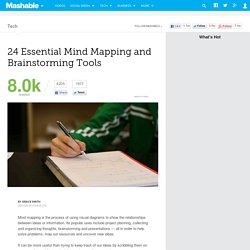
Its popular uses include project planning, collecting and organizing thoughts, brainstorming and presentations — all in order to help solve problems, map out resources and uncover new ideas. It can be more useful than trying to keep track of our ideas by scribbling them on paper, and can aid in manipulating and generating concepts. We've compiled a list of 24 mind mapping tools to help you organize, summarize and visualize information, with both free and paid versions available to suit any budget or requirement. The tools mentioned are either browser- or desktop-based, with a selection of mind mapping mobile apps at the end of the article for use on iOS and Android devices.
Is there a particular mind mapping tool you would recommend? 1. MindMeister was built to facilitate collaboration for mind mapping and brainstorming, with an intuitive, easy-to-use interface. 10 Great Tools for Academic Research You Should Know about. 1- Zotero Zotero is the only research tool that automatically senses content, allowing you to add it to your personal library with a single click.
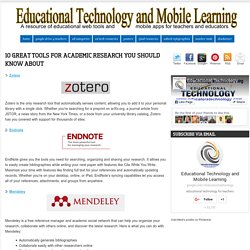
Whether you're searching for a preprint on arXiv.org, a journal article from JSTOR, a news story from the New York Times, or a book from your university library catalog, Zotero has you covered with support for thousands of sites. 2- Endnote EndNote gives you the tools you need for searching, organizing and sharing your research. It allows you to easily create bibliographies while writing your next paper with features like Cite While You Write . 3- Mendeley Mendeley is a free reference manager and academic social network that can help you organize your research, collaborate with others online, and discover the latest research. This is a great productivity app that helps you :Coordinate and complete tasks with your teams. 5- Scrivener 6- Camscanner 8- Google drive.
Research4LifeFree Digital Tools for Researchers. Could you imagine doing research without internet?
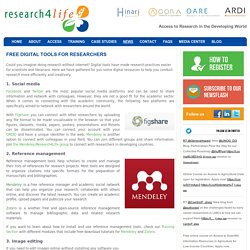
Digital tools have made research practices easier for scientists and librarians. Here we have gathered for you some digital resources to help you conduct research more efficiently and creatively. 1. Social media Facebook and Twitter are the most popular social media platforms and can be used to share information and network with colleagues.
With Figshare you can connect with other researchers by uploading any file format to be made visualisable in the browser so that your figures, datasets, media, papers, posters, presentations and filesets can be disseminated. Digital tools for researchers. Find out how digital tools can help you: Explore the literature(back to top) Here is a collection of digital tools that are designed to help researchers explore the millions of research articles available to this date.
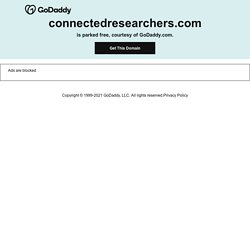
Search engines and curators help you to quickly find the articles you are interested in and stay up to date with the literature. Article visualization tools enhance your reading experience, for instance, by helping you navigate from a paper to another. Search engines and curators Article visualization.